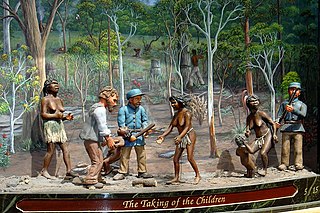
The Stolen Generations were the children of Australian Aboriginal and Torres Strait Islander descent who were removed from their families by the Australian federal and state government agencies and church missions, under acts of their respective parliaments. The removals of those referred to as "half-caste" children were conducted in the period between approximately 1905 and 1967, although in some places mixed-race children were still being taken into the 1970s.
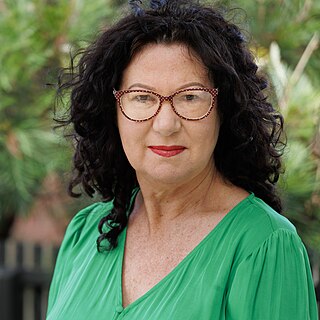
Jane Harrison is an Aboriginal Australian playwright, novelist, literary festival director, and researcher. Her best-known work is the play Stolen, which received critical claim and has toured nationally and internationally since 1998.

Australian literature is the written or literary work produced in the area or by the people of the Commonwealth of Australia and its preceding colonies. During its early Western history, Australia was a collection of British colonies; as such, its recognised literary tradition begins with and is linked to the broader tradition of English literature. However, the narrative art of Australian writers has, since 1788, introduced the character of a new continent into literature—exploring such themes as Aboriginality, mateship, egalitarianism, democracy, national identity, migration, Australia's unique location and geography, the complexities of urban living, and "the beauty and the terror" of life in the Australian bush.

Lowitja O'Donoghue, also known as Lois O'Donoghue and Lois Smart, was an Australian public administrator and Indigenous rights advocate. She was the inaugural chairperson of the Aboriginal and Torres Strait Islander Commission (ATSIC) from 1990 to 1996. She is known for her work in improving the health and welfare of Indigenous Australians, and also for the part she played in the drafting of the Native Title Act 1993, which established native title in Australia.
Murri is a demonym for Aboriginal Australians of modern-day Queensland and north-western New South Wales. For some people and organisations, the use of Indigenous language regional terms is an expression of pride in their heritage. The term includes many ethno-linguistic groups within the area, such as the Kamilaroi (Gamilaraay) and Yuggera (Jagera) peoples.
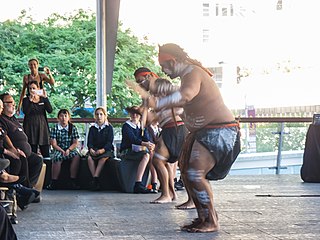
National Sorry Day, officially the National Day of Healing, is an event held annually in Australia on 26 May commemorating the Stolen Generations. It is part of the ongoing efforts towards reconciliation between Indigenous and non-Indigenous Australians.
Doris Pilkington Garimara, also known as Doris Pilkington, was an Aboriginal Australian author.

James "Jim" Moloney is an Australian children's author. A prolific writer whose books span an age range from seven- to seventeen-year-olds, he is best known for his young adult novels. He has been nominated and won awards for his books in the Children's Book Council of Australia Awards. His books have been translated into French, Korean, Lithuanian and Flemish/Dutch.
Ruth Hegarty is an Aboriginal Elder and author.
Samuel Wagan Watson is a contemporary Indigenous Australian poet.

Dougy is a 1993 young adult novel written by James Moloney, first published in 1993 by University of Queensland Press. By 2013 the National Library of Australia listed 18 editions of the novel in a variety of formats including book, audio book, braille and e-book. It is the first book in the Gracey trilogy, followed by Gracey (1994) and Angela (1998)
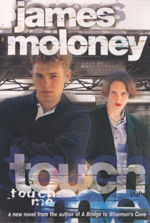
Touch Me (ISBN 0702231517) is a novel written by Australian author James Moloney. It was published in April 2000 by University of Queensland Press. The National Library of Australia holds eleven editions of this title including as a book, braille, sound recording, MP3 and electronic resource. It is also included in the Kerry White collection of Australian children's books.

Lisa (Marie) Bellear was an Indigenous Australian poet, photographer, activist, spokeswoman, dramatist, comedian and broadcaster. She was a Goenpul woman of the Noonuccal people of Minjerribah, Queensland. Her uncles were Bob Bellear, Australia's first Indigenous judge, and Sol Bellear who helped to found the Aboriginal Housing Corporation in Redfern in 1972.
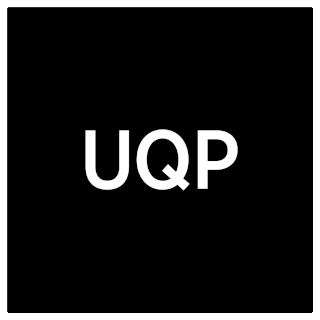
University of Queensland Press (UQP) is an Australian publishing house based in Brisbane, Queensland. Founded in 1948 as a wholly-owned subsidiary of the University of Queensland and a traditional university press, UQP now publishes books for general readers across fiction, non-fiction, and poetry, and includes works for children and young adults.
Gracey (9780702226106) is a young adult novel written by Australian author James Moloney and first published in 1994 by University of Queensland Press. By 2013 the National Library of Australia listed 24 editions of the novel in a variety of formats including book, audio book, braille and e-book. It is the second book in the Gracey trilogy, the first being Dougy (1993) and the third Angela (1998) In 1995 it was an Honour Book in the category of Older Readers in the Children's Book Council of Australia Awards. It is also part of the Kerry White collection of Australian children's books.
Molly Kelly was an Australian Martu Aboriginal woman, known for her escape from the Moore River Native Settlement in 1931 and subsequent 1,600 km (990 mi) trek home with her half-sister Daisy Kadibil and cousin Gracie Cross. She was a member of the Stolen Generations, who were part-white, part-Aboriginal children forcibly removed from their families by the Australian government. Her story was the inspiration for the book Follow the Rabbit-Proof Fence and the film Rabbit-Proof Fence.
Tony Birch is an Aboriginal Australian author, academic and activist. He regularly appears on ABC local radio and Radio National shows and at writers’ festivals. He was head of the honours programme for creative writing at the University of Melbourne before becoming the first recipient of the Dr Bruce McGuinness Indigenous Research Fellowship at Victoria University in Melbourne in June 2015.
Melanie Hogan is a film director and producer of Australian documentaries. Her directorial debut Kanyini premiered at the Sydney Film Festival in 2006.

Eileen Cummings is a teacher, policy and liaison officer and Indigenous leader in the Northern Territory of Australia. She is a member of the Rembarrnga Ngalakan ethnic groups. She is also a member of the 'Stolen Generation' and is an activist advocating for the well-being of living members of that group.

On 13 February 2008, the Parliament of Australia issued a formal apology to Indigenous Australians for forced removals of Australian Indigenous children from their families by Australian federal and state government agencies. The apology was delivered by Prime Minister Kevin Rudd, and is also referred to as the National Apology, or simply The Apology.












